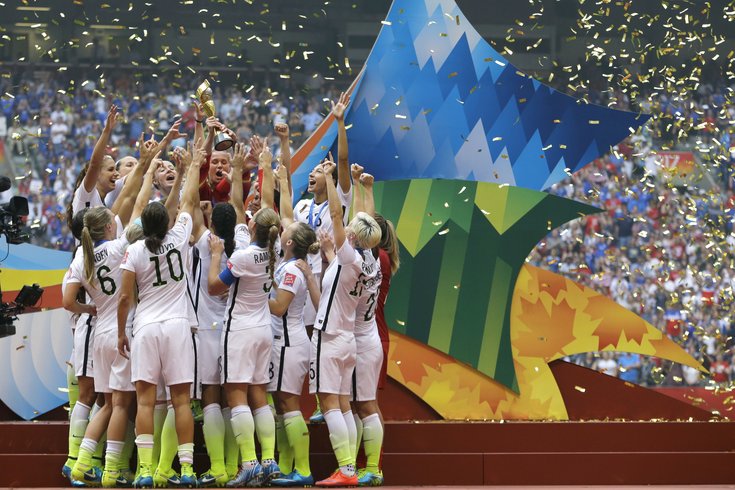
July 07, 2015
 Elaine Thompson/AP
Elaine Thompson/AP
The U.S. women's team celebrate's their 5-2 win over Japan in the World Cup Final.
In the past half century, there is no more important story in the history of sports than what took place in the United States back in 1972 when the first building blocks of Title IX were put into place.
The continuing results of that legislation were on display in Vancouver over the weekend when the US women’s soccer team won its third World Cup -- and local product Carli Lloyd, of Delran, earned a place in American sports lore by scoring a hat trick in the game's first 16 minutes.
But that is only the tip of the story.
The real story is all of the opportunities that were afforded to Lloyd and her teammates as a result of that legislation. The real story is all of the women who have not only participated in sports, but have been included in the entire sports culture – as players, coaches, trainers and spectators.
In a matter of just over two generations, young women have been afforded many of the same opportunities as young men to discover the value of participating in sports. The ancient idea that most women would simply stand and cheer on a team has been replaced by the notion that women have equal standing.
Mind you, this has nothing to do with TV ratings and money earnings.
There was always a place for that special female athlete in the worlds of tennis, golf and track. Way back to the days of Maureen Connolly or Babe Didrikson Zaharias or Wilma Rudolph, there were stories of women doing great things on certain athletic fields.
The difference now is that girls and young women are joining teams and learning about team bonding. They are encouraged to compete and find out what is so alluring about working to a common cause.
The value of Title IX can be found on athletic fields across America, where there are just as many girls kicking a soccer ball or hitting a softball as there are boys on the pitch or the diamonds.
Literally, the field has been leveled.
And it doesn’t just stop at the borders of the United States. In order to compete with US teams, other countries have had to “up their game,” and the winners have been women in those countries. From soccer to softball, from rugby to ice hockey, women across the globe are finding more doors open to play a game they love.
There have been arguments -- and some very good ones -- that Title IX came at the cost of some men’s team at the NCAA level. It would be impossible to dismiss those arguments, but if you stand back and look at the greater good caused by Title IX, it seems trivial compared to a few men’s team going by the wayside.
It is true that women’s sports can’t "pay their own way," but that should never be the point of providing athletic competition to the youth of a nation. What is far more important is the inherent value of playing those sports, the inherent value of competition, and the inherent value of camaraderie.
There is nothing scientific about the benefits, but ask anybody who has played a sport for a significant length of time and you are likely to find that it is through that sport that so many lifelong friendships have been made. It is also likely that contacts are being made, ones that continue through professional life.
No longer are those connect-the-dot contacts confined to men. There are now two generations of women who can also benefit from that, and there are sure to be more on the way as the daughters of those women are encouraged to take part in games.
We are often told a very shaky gospel that sports builds character. However, time and again that gospel rings hollow when we hear of transgressions by professional athletes.
For sure, as women gain more power, and even some stature in terms of money, there will be issues. The US women’s team had to deal with the domestic violence problems of goalie Hope Solo, but for the most part those stories are far less common than in the money-drenched world of male pro sports in America and the across the world.
The success of women’s sports and Title IX isn't about money, and it isn’t about the historic TV ratings for the championship game. And it isn’t even about the championship and the ticker tapes parade to follow.
The success of Title IX can only be measured on local fields, local courts and local rinks where girls are winning and losing, but mostly just competing. And when you compete, you can only ask for a level field.
Title IX provided that field of equality.